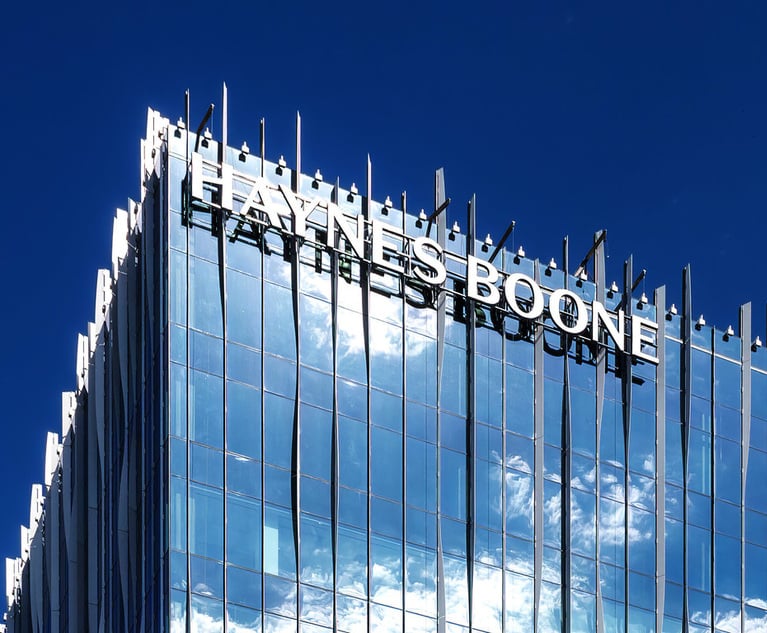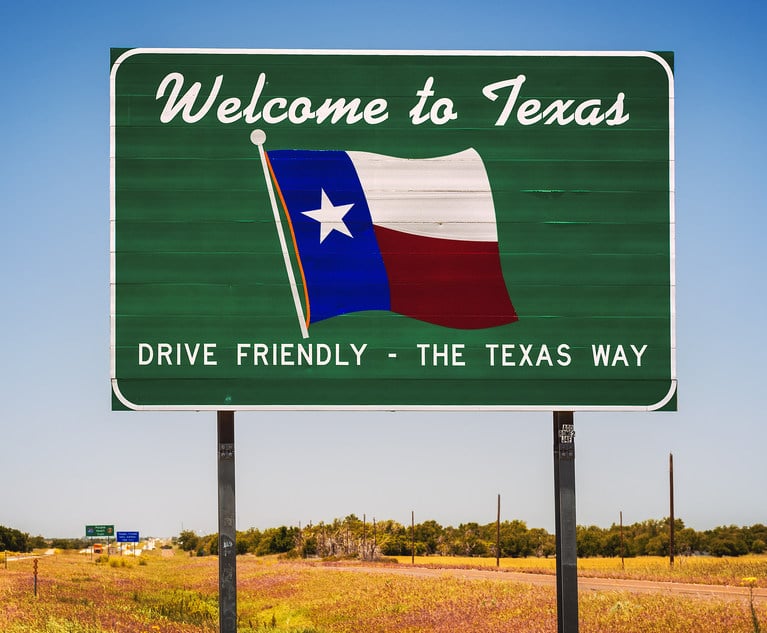 The State Bar of Texas, Austin. (Photo: ALM)
The State Bar of Texas, Austin. (Photo: ALM)Bad News for Lawyers Suing Over Bar Dues: Court Rules in Favor of Texas Bar
Three attorneys who sued the State Bar of Texas over mandatory membership and dues requirements have lost their case and now must pay the bar's costs.
June 01, 2020 at 12:55 PM
4 minute read
Three Texas attorneys have lost their claims that the State Bar of Texas violated their constitutional rights by allegedly using bar dues for political speech.
U.S. District Judge Lee Yeakel of Austin ordered that plaintiffs Tony McDonald, Josh Hammer and Mark Pulliam, who has an inactive license, take nothing from their lawsuit and also pay the costs for the Texas Bar, said the final judgment in McDonald v. Sorrels.
State Bar of Texas President Randy Sorrels said in a statement that he's pleased about the ruling.
"Almost six decades of U.S. Supreme Court precedent supports the constitutionality of the unified bar structure," Sorrels said. "The State Bar is carrying out its statutory obligations by regulating the legal profession and improving the quality of legal services in Texas."
Plaintiffs attorney Jeffrey Harris, partner in Consovoy McCarthy Park in Arlington, Virginia, declined to comment.
McDonald is one of many lawsuits filed nationally challenging mandatory bar membership in the wake of the 2018 U.S. Supreme Court decision in Janus v. AFSCME, which overturned decades of precedent by ruling that public-sector non-union workers cannot be required to pay union dues as a condition of employment.
Lawyer-plaintiffs in other states have also seen courts dismiss their claims. On Monday, the U.S. Supreme Court rejected one of these appeals, in Jarchow v. State Bar of Wisconsin. But Justices Clarence Thomas and Neil Gorsuch dissented, writing that Janus casts doubt on past precedent regarding mandatory bar associations
In McDonald, the court explained its ruling in an order on cross-motions for summary judgment. It explained that the plaintiffs argued that Janus overruled two previous U.S. Supreme Court cases, Lathrop v. Donohue and Keller v. State Bar of California, that were specific to bar associations and said mandatory dues were constitutional as long as the bar spent the money on improving legal services or regulating the profession.
"Keller and Lathrop directly control under the facts of this case, and therefore bind this court," Yeakel wrote in the order. "The court finds no basis for holding that Janus overrules Keller."
Only the U.S. Supreme Court can overrule those decisions, the order said.
The Texas Bar activities that the plaintiffs challenged here comply with Keller because they further the regulation of the legal profession and improvement of legal services. For example, the bar has established multiple steps to make sure its legislative lobbying activities comply with Keller, Yeakel wrote.
The court also rejected the plaintiffs arguments about a process that's in place for lawyers to object to the way the Texas Bar spends their membership dues. Yeakel wrote that lawyers could object at multiple public meetings before budgets are passed, and they can file a protest about specific expenses.
The order said, "Because the bar has adequate procedural safeguards in place to protect against compelled speech and because mandatory bar membership and compulsory fees to not otherwise violate the First Amendment, plaintiffs' claim that the bar unconstitutionally coerces them into funding allegedly non-chargeable activities without a meaningful opportunity to object necessarily fails as a matter of law."
Read the order:
Related stories:
This content has been archived. It is available through our partners, LexisNexis® and Bloomberg Law.
To view this content, please continue to their sites.
Not a Lexis Subscriber?
Subscribe Now
Not a Bloomberg Law Subscriber?
Subscribe Now
NOT FOR REPRINT
© 2024 ALM Global, LLC, All Rights Reserved. Request academic re-use from www.copyright.com. All other uses, submit a request to [email protected]. For more information visit Asset & Logo Licensing.
You Might Like
View All

Advising 'Capital-Intensive Spaces' Fuels Corporate Practice Growth For Haynes and Boone
4 minute read
Homegrown Texas Law Firms Expanded Outside the Lone Star State in 2024 As Out-of-State Firms Moved In
5 minute read
Energy Lawyers Working in Texas Expect Strong Demand to Continue in 2025 Across Energy Sector
6 minute readTrending Stories
- 1Holland & Knight Launches Export Control Disputes and Advocacy Team
- 2Blake Lively's claims that movie co-star launched smear campaign gets support in publicist's suit
- 3Middle District of Pennsylvania's U.S. Attorney Announces Resignation
- 4Vinson & Elkins: Traditional Energy Practice Meets Energy Transition
- 5After 2024's Regulatory Tsunami, Financial Services Firms Hope Storm Clouds Break
Who Got The Work
Michael G. Bongiorno, Andrew Scott Dulberg and Elizabeth E. Driscoll from Wilmer Cutler Pickering Hale and Dorr have stepped in to represent Symbotic Inc., an A.I.-enabled technology platform that focuses on increasing supply chain efficiency, and other defendants in a pending shareholder derivative lawsuit. The case, filed Oct. 2 in Massachusetts District Court by the Brown Law Firm on behalf of Stephen Austen, accuses certain officers and directors of misleading investors in regard to Symbotic's potential for margin growth by failing to disclose that the company was not equipped to timely deploy its systems or manage expenses through project delays. The case, assigned to U.S. District Judge Nathaniel M. Gorton, is 1:24-cv-12522, Austen v. Cohen et al.
Who Got The Work
Edmund Polubinski and Marie Killmond of Davis Polk & Wardwell have entered appearances for data platform software development company MongoDB and other defendants in a pending shareholder derivative lawsuit. The action, filed Oct. 7 in New York Southern District Court by the Brown Law Firm, accuses the company's directors and/or officers of falsely expressing confidence in the company’s restructuring of its sales incentive plan and downplaying the severity of decreases in its upfront commitments. The case is 1:24-cv-07594, Roy v. Ittycheria et al.
Who Got The Work
Amy O. Bruchs and Kurt F. Ellison of Michael Best & Friedrich have entered appearances for Epic Systems Corp. in a pending employment discrimination lawsuit. The suit was filed Sept. 7 in Wisconsin Western District Court by Levine Eisberner LLC and Siri & Glimstad on behalf of a project manager who claims that he was wrongfully terminated after applying for a religious exemption to the defendant's COVID-19 vaccine mandate. The case, assigned to U.S. Magistrate Judge Anita Marie Boor, is 3:24-cv-00630, Secker, Nathan v. Epic Systems Corporation.
Who Got The Work
David X. Sullivan, Thomas J. Finn and Gregory A. Hall from McCarter & English have entered appearances for Sunrun Installation Services in a pending civil rights lawsuit. The complaint was filed Sept. 4 in Connecticut District Court by attorney Robert M. Berke on behalf of former employee George Edward Steins, who was arrested and charged with employing an unregistered home improvement salesperson. The complaint alleges that had Sunrun informed the Connecticut Department of Consumer Protection that the plaintiff's employment had ended in 2017 and that he no longer held Sunrun's home improvement contractor license, he would not have been hit with charges, which were dismissed in May 2024. The case, assigned to U.S. District Judge Jeffrey A. Meyer, is 3:24-cv-01423, Steins v. Sunrun, Inc. et al.
Who Got The Work
Greenberg Traurig shareholder Joshua L. Raskin has entered an appearance for boohoo.com UK Ltd. in a pending patent infringement lawsuit. The suit, filed Sept. 3 in Texas Eastern District Court by Rozier Hardt McDonough on behalf of Alto Dynamics, asserts five patents related to an online shopping platform. The case, assigned to U.S. District Judge Rodney Gilstrap, is 2:24-cv-00719, Alto Dynamics, LLC v. boohoo.com UK Limited.
Featured Firms
Law Offices of Gary Martin Hays & Associates, P.C.
(470) 294-1674
Law Offices of Mark E. Salomone
(857) 444-6468
Smith & Hassler
(713) 739-1250






